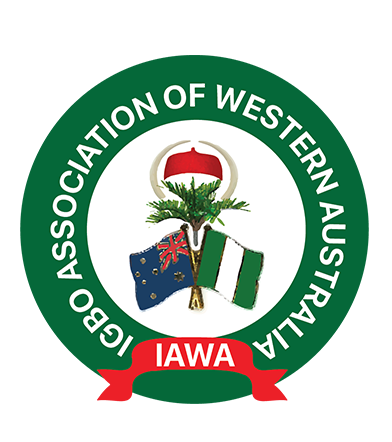Our History
In the years 2000, the first gathering of Igbos in Western Australia (WA) took place. At that time, there were only a few Igbos in WA. The arrival of Chief (Dr) Peters Ibekwe to Perth from Northern Territory heralded the commencement of the meeting. Along with here were the following founding members:
- Ozo Ezeama Lawrence Ogbue
- Dr Patrick N Okoye
- Ejiamatu Angus U Oraekwuotu
- Mazi Levi Ogbonna
- Mr Wisdom Okpara
- Mr Paul- Davies Maduka
- Few students
At that time, there was no formal organization of either Nigeria or Igbo community of any sort in Western Australia.
These men started meeting at Chief Dr Peters Ibekwe’s residence in Midland. They were called Ndi Ikom. No formal discussions were held of any kind. They would simply meet, have boys talk over a drink of palm wine, boiled stockfish dipped in red pepper and palm oil. With time this became more regularized and expanded to include students and new arrivals of Igbo extraction.
In 2005, this informal gathering of Igbo people at Chief Peters residence was expanded to other members. Meetings were taken to Mr. Wisdom Okpara and Mr. Paul-Davies Maduka’s business premises in Kenwick. It was with these expansions that the idea of the registration of the Igbo Association of Western Australia (IAWA) was conceived.
Chief Peters Ibekwe was unanimously appointed the chairman of the new IAWA with Dr Patrick Okoye as the secretary, Mr Angus N Oraekwuotu as the treasurer and financial secretary. From then on, meetings were held monthly and rotated from one family house to another. The meetings were marked by friendship, fellowship, companionship, and camaraderie among members. This unity was evident in 2007 with the passing away of Pa Chukwuike, when the Igbos came together to mourn and arrange for his corpse to be sent home to Nigeria.
As the Association increased in number and strength, the first IAWA constitution was drafted and incorporated on 7th of December 2009, under the Association incorporation Act, WA. The Primary aims of the association included but were not limited to fostering unity and peace among the Igbo, cultural preservation, and promotion, to serve as reference point in all matters relating Ndi Igbo and Igbo Nation in WA, promotion of Igbo welfare in WA and peaceful co-existence among Igbos and other ethnic nationalities in Western Australia.
In a meeting of the Association at Ozo Lawrence Ogbue’s residence in 2009, the first ever election for the executive committee of the Association was held, and Dr. Princewill E Chuka emerged as the first elected Chairman of the association. Ozo Lawrence Ogbue emerged as the vice Chairman, Cynthia Agu (Nee Peters) Secretary, Olivia Izuka (Treasurer), Dr Michael Nwokeiwu (Financial secretary), Grace Obidike (Social Secretary) and Gloria Oraekwuotu (PRO).
Igbo Association since its inception and incorporation has made tremendous progress in areas of arts, culture, and language promotion. The Association has held yearly the annual New Yam Festival (Iri ji), during which we display our culture (food, dance, music, drama, arts, and folklores) for the entertainment of Western Australian diverse communities.
Dr Princewill Chuka, Dr Patrick Okoye, Chief Peters Ibekwe were the architects for the initiation of WA government funding that helps to sustain the resuscitated near dying language of Igbo people as attested by the United Nations Educational, Scientific, and Cultural organization (UNESCO). IAWA established an Igbo language school with seed funding from the office of multicultural Interests, WA department of Local government and communities. Efforts is also underway to develop a centre for Igbo Language Arts and Culture (CILAC) as declared during its inauguration in 2014 in the chairman’s address, which will become a repertoire of resources for research in Igbo arts, language, and culture.
Over these years since its birth the Association continue to achieve milestones, navigate its challenges, and has become a household name in the comity of communities in WA. As of today, IAWA has expanded to over three hundred members with a well-structured language school to cater for the language and cultural needs of Igbo people in WA. The association has continued to pioneer innovative cultural displays as well as outstanding commitment to the advancement of the growth and development of Igbos in WA.
The Association holds a very bright future with its teaming young population and membership.
